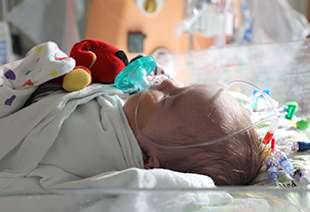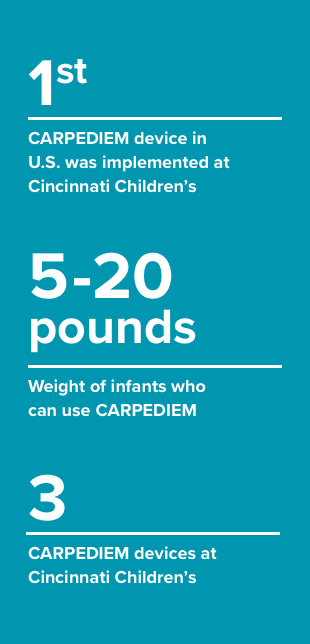New Infant CRRT Technology Offers Improved Outcomes

Early use of the newly FDA-approved CARPEDIEM continuous renal replacement therapy (CRRT) technology at Cincinnati Children’s has demonstrated its effectiveness in improving outcomes for babies with failing kidneys. Stuart Goldstein, MD, FAAP, FNKF, director of the Center for Acute Care Nephrology at Cincinnati Children’s, was a clinical consultant in developing the Cardio-Renal Pediatric Dialysis Emergency Machine, designed for infants weighing 5 to 20 pounds.
One of the first U.S. patients to benefit from the technology, Baby Brenden, came to Cincinnati Children’s from a hospital in Lexington, Kentucky, with end-stage kidney failure and a serious abdominal infection. Brenden could not tolerate CRRT with standard technology in Lexington, and he was referred to Cincinnati Children’s specifically for support with CARPEDIEM.

“When Brenden came here, he was probably close to twice his true weight with fluid overload,” Goldstein says. “This machine absolutely saved his life. Over a week or so, we were able to slowly and safely remove that fluid.”
Restored to his normal weight, Brenden went back to his home hospital for continued care with peritoneal dialysis.
In addition, a 4-month-old infant on cardiac extracorporeal membrane oxygenation (ECMO) in a cardiac intensive care unit was transferred to Cincinnati Children’s and became the first in the world to be treated with CARPEDIEM while on ECMO. The infant had developed severe kidney injury, and Goldstein’s team successfully integrated the two technologies.
“By achieving precise fluid balance, we provided the patient with a number of extra days for the heart to recover function. For our other patients to date, we have been able to use CARPEDIEM therapy effectively, as well,” Goldstein says.
How CARPEDIEM Works
Designed to help infants with acute kidney failure and fluid overload achieve fluid balance, CARPEDIEM features three small rotors that allow for lower blood flow and less risk of blood clots. In addition, CARPEDIEM filters are half as small as those of adult CRRT machines. Goldstein says the technology is far superior to adapting adult CRRT machines for babies.
Cincinnati Children’s has further reduced risk of blood clots with a citrate regional anticoagulation protocol, which Goldstein notes is safer than standard heparin for critically ill patients.
“CARPEDIEM fills a gap in care for neonates and infants who need precise fluid balance,” Goldstein states. “I expect to continue to see great outcomes for these kids in the future.”
Expanding Use
Cincinnati Children’s has three CARPEDIEM devices. Following its initial successes, CARPEDIEM manufacturer Medtronic is installing machines in pediatric facilities across the country.
Goldstein says, “We’re sharing our protocols and practices with other facilities so kids can get the best possible care.”
For more information, email stuart.goldstein@cchmc.org.

